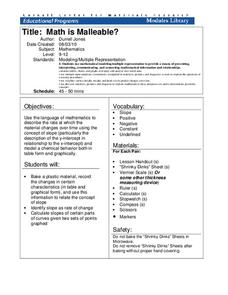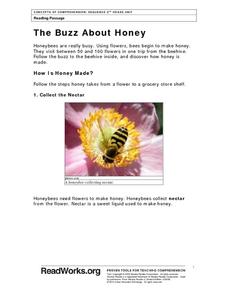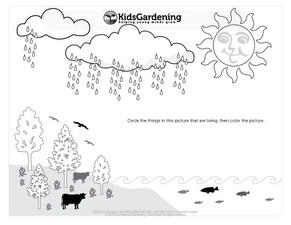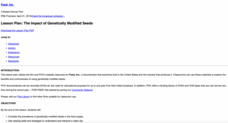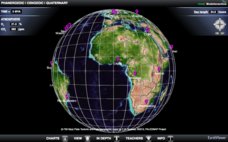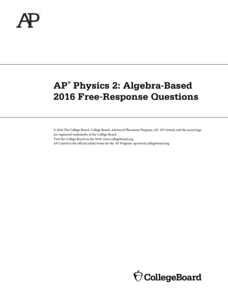CK-12 Foundation
Location on the Earth: Longitude and Latitude
To what degree do learners understand coordinates? Get them some practice in Yosemite National Park in a simple, fun interactive. Pupils explore a map and locate coordinates of popular sights within the park, then answer questions...
Curated OER
Temperature and the Earth's Atmosphere
Earth science super stars visit the National Earth Science Teachers Association's interactive website to glean information on the layers of the atmosphere. Data tables are provided for them to record what is collected. This assignment...
CK-12 Foundation
Direction on the Earth: Using a Compass
Navigate the world of orienteering in an informative interactive. Earth science scholars learn practical direction skills, such as proper polar coordinates and pairing compasses with maps. The interactive map allows them to practice...
CK-12 Foundation
Satellites, Shuttles, and Space Stations: Satellites in Orbit
Blast off! How do satellites, space shuttles, and space stations escape Earth's gravity and achieve orbit? Young astronauts study rocket science (literally) with an interactive lesson. They discover the four main uses for satellites, how...
Virginia Department of Education
Cell Division
Searching for simple ways to teach mitosis to high schoolers? Using colored chalk and onion root tips, pupils visually demonstrate what they view when looking through the lens of a microscope. There are also various ways to expand the...
Cornell University
Math Is Malleable?
Learn about polymers while playing with shrinky dinks. Young scholars create a shrinky dink design, bake it, and then record the area, volume, and thickness over time. They model the data using a graph and highlight the key features of...
Curated OER
Disease, Environment, Health, Human Populations, and Modern Technology
What is a pandemic, epidemic, and a vaccine? What changes have occurred in health and environmental awareness with the advent of new technology? This 20 question multiple choice quiz asks kids to answer who, what, when, and where about...
Curated OER
Double Replacement Reactions
There's not much to this presentation, but what is here can be useful. The main slide, which is inexplicably repeated, simply shows an example of both a single-replacement and a double-replacement reaction and then their general forms....
Massachusetts Institute of Technology
List of Chemicals in Space
What is space made of? It turns out that there are many compounds found in space! The 10th lesson of a science series provides a list of the compounds found in space and asks young scholars to research the characteristics of these...
Curated OER
The Buzz About Honey
What's the buzz these days? Learn some fun and interesting facts about honeybees with an informational reading passage, including the steps for successful pollination and honey creation.
CK-12 Foundation
Black Hole
What happens to radio waves, time, and light in and near a black hole? Young scientists explore what is known about observing frequency and time at various distances from a black hole. They control the size of the black hole and the...
National Gardening Association
Living Things Coloring Page
A simple assignment requires little life scientists to identify what is alive. Rain is falling, the sun is shining, birds are flying, fish are swimming, and students simply circle the items that are living.
Beyond Benign
Writing the Principles
What is the difference between chemistry and green chemistry? The first lesson of the 24-part green chemistry series introduces scholars to its 12 principles. The tendency is toward nontoxic materials and sustainability.
Tumblehome
Resisting Scientific Misinformation
How do scholars determine if a scientific claim is true? Learners investigate scientific misinformation by watching video clips and reading false advertising claims. They engage in discussion in both class and small group settings to...
PBS
The Impact of Genetically Modified Seeds
What is all the fuss about genetically modified foods? PBS provides this resource designed to supplement the documentary Food, Inc. to help learners investigate the benefits and controversies of genetically modified foods...
Beyond Benign
Urine Jeopardy
Urine can tell us a lot about what is happening in our bodies. In a hands-on activity, scholars administer pH, glucose, ketone, and protein tests to a sample of "urine" solution made from household ingredients. Their results lead them to...
CK-12 Foundation
Unicycle
What is the steepness of a hill before a unicyclist slides down it rather than pedaling down it? The simulation graphs the wheel speed versus the unicycle speed as the rider goes down a hill. Scholars control the mass of the rider,...
K20 LEARN
Water We Going To Do? Floodplains And Watershed Management
How has human activity affected Earth's watersheds? An action-packed lesson plan, part of the K20 Center, examines water's ability to go with the flow regardless of what is in its path. Scholars build model watersheds, examine time-lapse...
Howard Hughes Medical Institute
EarthViewer
Almost complete annihilation of the plants and animals on the Earth has occurred at least five times in the past. Young scientists explore each of these events. They learn about the evidence and conclusions for each event and connect...
Howard Hughes Medical Institute
Test Your Knowledge of Sex Determination
Humans, fruit flies, and reptiles have their own rules where sex chromosomes are concerned. Scholars flip through a slide show offering an explanation of the chromosomes that determine the sex of different species. What is female in one...
College Board
2016 AP® Physics 2: Algebra-Based Free-Response Questions
While AP Physics 1 counts as an introductory college Physics course, AP Physics 2 counts as a second-year college Physics course. Help scholars prepare for this more advanced college-level test with questions from previous assessments...
College Board
AP Biology Practice Exam 2013
What is the best way to prepare for an AP® exam? Learners become familiar with the AP® Biology exam by completing a full-length practice exam. The AP® test prep by the College Board contains multiple choice, grid-in, and free-response...
Curated OER
What is a Living Thing, and How Does a Living Thing Respond to Its Environment?
Students investigate how living things interact with their environment. In this living things lesson, students complete lessons for science investigations on what living things have in common. Students study cells, complete...
Curated OER
What it means to be a scientist and What is the Scientific Process?
Students read an article and describe the scientific method. In this scientific process lesson, students compare basic science and applied science. Students discuss ideas such as team work, application of an idea, how scientists...
Other popular searches
- What Is Science Important
- What Is Science Worksheets
- Science What Is Science
- What Is Science Fiction
- What Is Science Worhsheets
- What Is a Science Theory
- What Is Science Skills?
- What Is Science Florida
- Science What Is a Rock?





